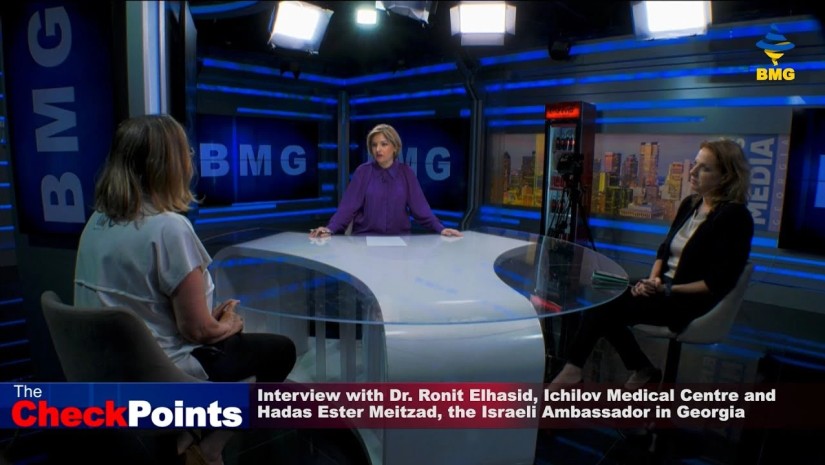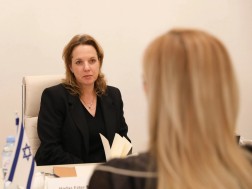The Georgian Government will fully finance treatment of children with oncological diseases in medical institutions of Israel, Spain and Turkey in the wake of signing a deal on cooperation with partner clinics, the Health Ministry announced.
Ekaterine Pestvenidze, the Acting Executive Director of the Solidarity Fund - established in 2014 on the initiative of Prime Minister Irakli Garibashvili to encourage donations for covering treatment for children with cancer and other priority social needs - held a presentation on the programme and discussed opportunities for recipients, noting one of the Fund’s beneficiaries was preparing to visit the Turkish facility involved in the deal for treatment.
In his comments, Minister Zurab Azarashvili said the state had “laid the foundation for a historic project” to provide quality healthcare and equal access to “high-quality” medical services within and outside the country for all children patients.
He also said the state has taken “full responsibility” and pledged to treat all children with oncological diagnoses in the “best clinics” around the world as a part of the $12mln programme with no budget limitations.
Azarashvili noted the Government had also taken "novel steps" to ensure “vital” health services for children with oncology diagnoses domestically at the end of last year, on the initiative of Prime Minister Irakli Garibashvili. He said providing access to "quality" medical services for children was "clearly reflected" in the Government policy and long-term strategy and indicated a full range of high-quality medical services would be made available in the country “in the shortest amount of time”.
The Checkpoints hosted Professor Ronit Elhasid, the Director of Pediatric Hemato-Oncology Department at Ichilov Medical Centre in Israel and Hadas Ester Meitzad, the Israeli Ambassador in Georgia.
Dr. Elhasid, this is your second visit. January this year is the time these talks started. What has changed since January?
Ronit Elhasid: Well, there’s no snow.
No snow – that’s also important.
Ronit Elhasid: But what has changed most importantly – we have an agreement now. We are happy with this agreement. It is a collaboration between Georgia and Israel for the benefit of young children with cancer. My specialty is treating the children with cancer. I have been doing it for many years and it is my privilege to help other children in another country.
What do you anticipate from this cooperation with Georgia and what was your hospital’s motivation be involved in this program?
Ronit Elhasid: There was a call from the Minister for help. We answered this call. Because we have all the experience and the technique to treat children with malignancy. We’ve done it for many years in Israel and our motivation is to treat other patients with cancer, especially now that we have agreement in Georgia.
So, what are some of the opportunities that this agreement will open up for Georgia’s kids?
Ronit Elhasid: These days you can cure more than 80% of children with cancer. In leukemia you can cure even 90% of children. This will bring the children of Georgia this hopeful salvage from the disease. You know for treating children with cancer you should know how to do it. You should know how to diagnose it. Then you have to know how to treat it and bring the success without the toxicity. And we have the ability to do it. A lot of motivation to help other children in another country.
Ambassador Meitsad, there are three countries at the moment involved in this program. It is Turkey, Spain and Israel. Why – Israel? What makes this country competitive in this sphere?
Hadas Ester Meitzad: Israel has the top of the art, very advanced medical facility - Ichilov is one of them. As professor Hasid said, there was a call from the Georgian Minister of Health. We have to say here that we are very grateful and appreciative of the work that was done by the Ministry and the Solidarity Fund of Georgia for the quick pace with which this project has been moving forward. It’s just 6 months and we have already signed an agreement. Israel truly believes that what we know we must share it with the rest of the world. We’re doing it through the foreign aid; we’re doing it in cooperation such as this. At the end of the day if we have the knowledge, if we have the solution, if we have the ability to help, we will always reach out and help as much as we can.
Dr. Elhasid, back to you - what would be the measurable outcomes that you will be monitoring during this program?
Ronit Elhasid: First, we will treat the children. And by the time, Georgian Health Ministry and all the team will build a center for treating cancer in children. By the time it is done, we could continue helping Georgia but in the meantime it happens, we will take children from Georgia to Israel for treatment.
You mentioned that most of cancer can be cured. What is the role of infrastructure and R&D in this?
Ronit Elhasid: You need to have infrastructure. You need to know how to do a right diagnosis. This is the first thing. Once you do the right diagnosis, you need to treat it according to the international protocols with a lot of experience in this specific malignancy. Then you need to have a multidisciplinary team to help avoid toxicity and help avoid late effects. We in Israel have all this in our Center. We have the best facilities for diagnosis – surgery, genetic analysis – everything. We use international European protocols for treating the Israeli children and this will be the same for the Georgian children. And we have special facilities to avoid all this toxicity and to treat it when it comes and do our best for the child to be healthy.
In general, is this treatment expensive? I would think so since it involves so much expertise, so much infrastructure, so much innovation ..
Ronit Elhasid: This issue is between the clinic and the Ministry. I am here to treat children.
What could Georgia learn from this cooperation with Israel?
Ronit Elhasid: How to do a diagnosis; which protocol to use to treat each disease and learn to be a very qualified and good Center for children with malignancy.
Hadas Ester Meitsad: If I may add to this – we already have a very good partnership between Israel and Georgia in many aspects, including in health. Even before this agreement came to be realized there was a lot of cooperation based on personal relations. Two months ago, I attended a conference that was arranged by TSU Medical School to honor an Israeli doctor – a neurosurgeon – who was working here. We are going to have another conference in two months again – Israeli conference that will take place here in Georgia – with Georgian doctors. So we have all this personal based cooperation, and now we have this institutionalized cooperation. I think in the long term when the Minister and the Prime Minister are talking about establishing here the first public hospital that will be for the treatment of children with cancer - oncological pediatric center – I think we Israel will be privileged and honored to assist, to follow, to train, to do whatever it takes – of course, it depends on the ToR and project itself – but for us this responsibility comes with a lot of honor to be trusted to take care of the children; to assist Georgia in this project to develop domestic capacities to be able to treat children in the future in Georgia and not to send them out.
















